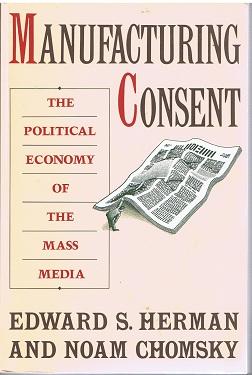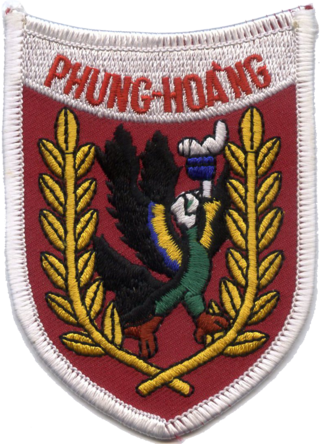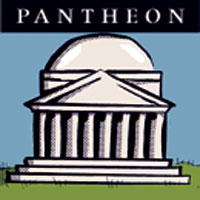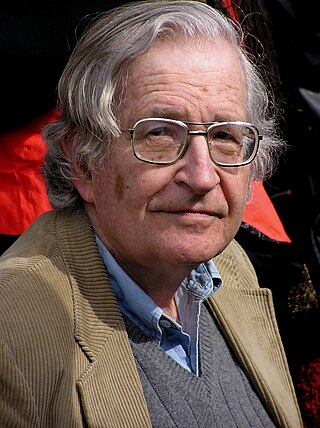
Manufacturing Consent: The Political Economy of the Mass Media is a 1988 book by Edward S. Herman and Noam Chomsky. It argues that the mass communication media of the U.S. "are effective and powerful ideological institutions that carry out a system-supportive propaganda function, by reliance on market forces, internalized assumptions, and self-censorship, and without overt coercion", by means of the propaganda model of communication. The title refers to consent of the governed, and derives from the phrase "the manufacture of consent" used by Walter Lippmann in Public Opinion (1922). The book was honored with the Orwell Award.

Avram Noam Chomsky is an American professor and public intellectual known for his work in linguistics, political activism, and social criticism. Sometimes called "the father of modern linguistics", Chomsky is also a major figure in analytic philosophy and one of the founders of the field of cognitive science. He is a laureate professor of linguistics at the University of Arizona and an institute professor emeritus at the Massachusetts Institute of Technology (MIT). Among the most cited living authors, Chomsky has written more than 150 books on topics such as linguistics, war, and politics. Ideologically, he aligns with anarcho-syndicalism and libertarian socialism.

The Vietnam War was a conflict in Vietnam, Laos, and Cambodia from 1 November 1955 to the fall of Saigon on 30 April 1975. It was the second of the Indochina Wars and was a major conflict of the Cold War. While the war was officially fought between North Vietnam and South Vietnam, the north was supported by the Soviet Union, China, and other communist states, while the south was supported by the United States and other anti-communist allies, making the war a proxy war between the United States and the Soviet Union. It lasted almost 20 years, with direct U.S. military involvement ending in 1973. The conflict also spilled over into neighboring states, exacerbating the Laotian Civil War and the Cambodian Civil War, which ended with all three countries officially becoming communist states by 1976.

The Viet Cong was an epithet to call the communist movement and united front organization in South Vietnam, Laos and Cambodia. Formally organized as and led by the National Liberation Front of South Vietnam, it fought under the direction of North Vietnam against the South Vietnamese and United States governments during the Vietnam War. The organization had both guerrilla and regular army units, as well as a network of cadres who organized and mobilized peasants in the territory the Viet Cong controlled. During the war, communist fighters and some anti-war activists claimed that the Viet Cong was an insurgency indigenous to the South, while the U.S. and South Vietnamese governments portrayed the group as a tool of North Vietnam. According to Trần Văn Trà, the Viet Cong's top commander, and the post-war Vietnamese government's official history, the Viet Cong followed orders from Hanoi and were practically part of the People's Army of Vietnam, or North Vietnamese army.

The propaganda model is a conceptual model in political economy advanced by Edward S. Herman and Noam Chomsky to explain how propaganda and systemic biases function in corporate mass media. The model seeks to explain how populations are manipulated and how consent for economic, social, and political policies, both foreign and domestic, is "manufactured" in the public mind due to this propaganda. The theory posits that the way in which corporate media is structured creates an inherent conflict of interest and therefore acts as propaganda for anti-democratic elements.

Hegemony or Survival: America's Quest for Global Dominance is a book about the United States and its foreign policy written by American political activist and linguist Noam Chomsky. It was first published in the United States in November 2003 by Metropolitan Books and then in the United Kingdom by Penguin Books.
Edward Samuel Herman was an American economist, media scholar and social critic. Herman is known for his media criticism, in particular the propaganda model hypothesis he developed with Noam Chomsky, a frequent co-writer. He held an appointment as Professor Emeritus of finance at the Wharton School of Business of the University of Pennsylvania. He also taught at Annenberg School for Communication at the University of Pennsylvania.

The Huế massacre was the summary executions and mass murder perpetrated by the Viet Cong (VC) and People's Army of Vietnam (PAVN) during their capture, military occupation and later withdrawal from the city of Huế during the Tet Offensive, considered one of the longest and bloodiest battles of the Vietnam War.

The Strategic Hamlet Program was a plan by the government of South Vietnam in conjunction with the US government and ARPA during the Vietnam War to combat the communist insurgency by pacifying the countryside and reducing the influence of the communists among the rural population.

The Phoenix Program was designed and initially coordinated by the United States Central Intelligence Agency (CIA) during the Vietnam War, involving the American, Australian, and South Vietnamese militaries. In 1969, CIA responsibility was phased out, and the program was put under the authority of the Civil Operations and Revolutionary Development Support (CORDS).

Pantheon Books is an American book publishing imprint with editorial independence. It is part of the Knopf Doubleday Publishing Group.
The following outline is provided as an overview of and topical guide to the Vietnam War:

Bernard B. Fall was a prominent war correspondent, historian, political scientist, and expert on Indochina during the 1950s and 1960s. Born in Austria, he moved with his family to France as a child after the Anschluss. He started fighting for the French Resistance at the age of 16 and later for the French Army during World War II.

Noam Chomsky is an intellectual, political activist, and critic of the foreign policy of the United States and other governments. Noam Chomsky describes himself as an anarcho-syndicalist and libertarian socialist, and is considered to be a key intellectual figure within the left wing of politics of the United States.
"The Responsibility of Intellectuals" is an essay by the American academic Noam Chomsky, which was published as a special supplement by The New York Review of Books on 23 February 1967.

"Objectivity and Liberal Scholarship" is an essay by the American academic Noam Chomsky. It was first published as part of Chomsky's American Power and the New Mandarins. Parts of the essay were delivered as a lecture at New York University in March 1968, as part of Albert Schweitzer Lecture Series. The first third of the essay, "The Menace of Liberal Scholarship" by Noam Chomsky in The New York Review of Books, January 2, 1969, was taken "almost verbatim" from this essay.
This is a list of writings published by the American author Noam Chomsky.

Cambodian genocide denial is the belief expressed by some Western academics that early claims of atrocities committed by the Khmer Rouge government (1975–1979) in Cambodia were much exaggerated. Many scholars of Cambodia and intellectuals opposed to the U.S. involvement in the Vietnam War denied or minimized reports of human rights abuses of the Khmer Rouge, characterizing contrary reports as "tales told by refugees" and U.S. propaganda. They viewed the assumption of power by the Communist Party of Kampuchea as a positive development for the people of Cambodia who had been severely impacted by the Vietnam War and the Cambodian Civil War. On the other side of the argument, anti-communists in the United States and elsewhere saw in the rule of the Khmer Rouge vindication of their belief that the victory of Communist governments in Southeast Asia would lead to a "bloodbath."

Decoding Chomsky: Science and Revolutionary Politics is a 2016 book by the anthropologist Chris Knight on Noam Chomsky's approach to politics and science. Knight admires Chomsky's politics, but argues that his linguistic theories were influenced in damaging ways by his immersion since the early 1950s in an intellectual culture heavily dominated by US military priorities, an immersion deepened when he secured employment in a Pentagon-funded electronics laboratory in the Massachusetts Institute of Technology.
Towards a New Cold War: Essays on the Current Crisis and How We Got There is a 1982 book by Noam Chomsky. It is an extensive exploration of American foreign policy during the late Vietnam War era up until the start of Reagan's presidency.















